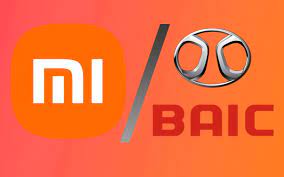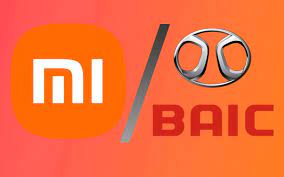
As it struggles to obtain a licence to manufacture cars on its own, smartphone maker Xiaomi Corp is considering a production partnership with Beijing Automotive Group Co (BAIC) to produce electric vehicles (EVs), according to a Friday report by Bloomberg News.
Since state planners have been restricting the issuance of manufacturing licences to new EV makers in an effort to contain excessive investment, such partnerships between EV startups and conventional automakers have become more prevalent in China.
Nio Inc., a Chinese EV manufacturer, for instance, collaborates on vehicle production with Jianghuai Automobile Group (JAC), a government-owned company in the Anhui province.
In accordance with the agreement, the startup's Nio cars had to initially be marked with JAC's nameplate; however, both parties later decided to do away with the nameplate to avoid paying additional fees.
According to the Bloomberg report, which cited people familiar with the situation, Xiaomi and BAIC are considering a number of options, including Xiaomi purchasing a stake in Beijing Hyundai No. 2, which has a licence to manufacture cars in China.
According to the report, the partnership may result in vehicles that are co-branded with Xiaomi and built by Beijing Automotive's EV brand, BAIC BluePark New Energy Technology Co.
Neither Xiaomi nor BAIC would comment. Given that he was not authorised to speak to the media, the executive at Beijing Electric Vehicle Co, BAIC's electric vehicle division, told Reuters that he was not aware of any such discussions between Xiaomi and BAIC.
The claims made about the South Korean company in the story, according to a spokesperson for Hyundai, are "groundless."
Three manufacturing facilities for Hyundai Beijing, a joint venture between Hyundai Motor Co. and BAIC, are located in Beijing.
Xiaomi announced its intention to enter the competitive EV market and compete against established brands and newer tech companies last year, and earlier this year it began construction on its first auto factory in Beijing.
The plant will be able to produce 300,000 units per year.
In the first half of 2024, Xiaomi promised to start producing its cars in large quantities. The business began building its first auto factory in Beijing earlier this year.
(Source:www.bloomberg.com)
Since state planners have been restricting the issuance of manufacturing licences to new EV makers in an effort to contain excessive investment, such partnerships between EV startups and conventional automakers have become more prevalent in China.
Nio Inc., a Chinese EV manufacturer, for instance, collaborates on vehicle production with Jianghuai Automobile Group (JAC), a government-owned company in the Anhui province.
In accordance with the agreement, the startup's Nio cars had to initially be marked with JAC's nameplate; however, both parties later decided to do away with the nameplate to avoid paying additional fees.
According to the Bloomberg report, which cited people familiar with the situation, Xiaomi and BAIC are considering a number of options, including Xiaomi purchasing a stake in Beijing Hyundai No. 2, which has a licence to manufacture cars in China.
According to the report, the partnership may result in vehicles that are co-branded with Xiaomi and built by Beijing Automotive's EV brand, BAIC BluePark New Energy Technology Co.
Neither Xiaomi nor BAIC would comment. Given that he was not authorised to speak to the media, the executive at Beijing Electric Vehicle Co, BAIC's electric vehicle division, told Reuters that he was not aware of any such discussions between Xiaomi and BAIC.
The claims made about the South Korean company in the story, according to a spokesperson for Hyundai, are "groundless."
Three manufacturing facilities for Hyundai Beijing, a joint venture between Hyundai Motor Co. and BAIC, are located in Beijing.
Xiaomi announced its intention to enter the competitive EV market and compete against established brands and newer tech companies last year, and earlier this year it began construction on its first auto factory in Beijing.
The plant will be able to produce 300,000 units per year.
In the first half of 2024, Xiaomi promised to start producing its cars in large quantities. The business began building its first auto factory in Beijing earlier this year.
(Source:www.bloomberg.com)














